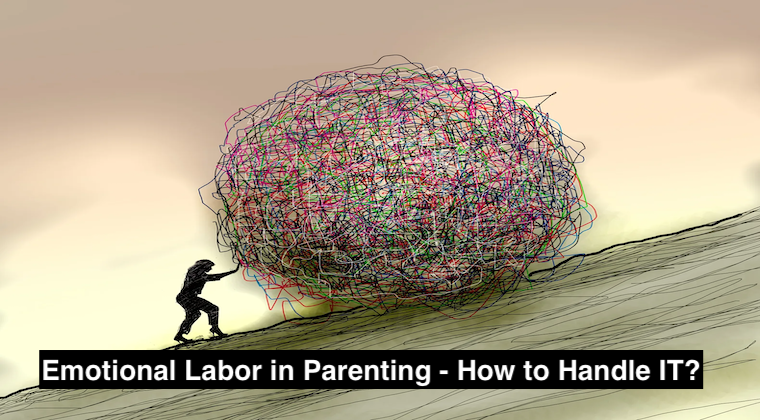+1 845 259 2974 (11 a.m to 7 p.m CST)
Emotional Labor in Parenting – How to Handle it?

Parenting is often celebrated for its joys and rewards. However, behind the scenes, many parents battle with the unseen, emotional labor that comes with raising children. This emotional labor involves managing the emotional well-being of the family, which can be exhausting and overwhelming. Let’s look into understanding emotional labor in parenting, recognizing its signs, exploring its causes, and discovering effective strategies to manage it.
Emotional Labor in Parenting
Emotional labor refers to the effort required to manage and regulate one’s own emotions while tending to the emotional needs of others. In the context of parenting, this can include comforting a crying child, resolving sibling conflicts, and maintaining a positive home atmosphere. Unlike physical tasks, emotional labor is often invisible and goes unrecognized, yet it is crucial for the family's emotional health.
Signs of Emotional Labor Overload
Many parents may not realize they are experiencing emotional labor overload until they reach a breaking point. Common signs include:
- Emotional Exhaustion: Constantly feeling drained and unable to recharge.
- Feelings of Resentment: Resenting the continuous demands and lack of appreciation.
- Physical Symptoms: Experiencing headaches, insomnia, or other stress-related ailments.
- Impact on Mental Health: Increased anxiety, depression, or mood swings.
Recognizing these signs early can help parents take proactive steps to manage their emotional labor.
Causes of Emotional Labor in Parenting
Several factors contribute to the emotional labor parents experience:
- Societal Expectations and Gender Roles: Traditional gender roles often place a disproportionate amount of emotional labor on mothers, expecting them to be the primary caregivers and emotional anchors of the family.
- Lack of Support: When partners or extended family members do not share in the emotional responsibilities, the burden on one parent increases.
- Balancing Work and Home Responsibilities: Juggling a career and home life adds an extra layer of emotional stress, as parents try to meet professional demands while being emotionally available for their children.
Effects of Emotional Labor on Parents
The impact of emotional labor on parents can be profound:
- Mental Health Implications: Continuous emotional labor can lead to burnout, anxiety, and depression.
- Relationship Strain: The imbalance in emotional responsibilities can cause tension and resentment between partners.
- Impact on Parenting Quality: Stressed and emotionally drained parents may struggle to provide the nurturing environment their children need.
Strategies to Handle Emotional Labor
Managing emotional labor requires conscious effort and practical strategies:
- Open Communication with Partners: Discuss the emotional responsibilities and ensure both partners share the load. Regularly check in with each other to reassess and redistribute tasks as needed.
- Setting Boundaries and Realistic Expectations: Learn to say no and prioritize what is truly important. Avoid overcommitting and setting unattainable standards.
- Delegating Tasks and Seeking Support: Share responsibilities with your partner, involve older children in age-appropriate tasks, and don’t hesitate to ask for help from family or friends.
- Self-Care and Mindfulness Practices: Prioritize self-care by setting aside time for activities that recharge you, such as exercise, hobbies, or quiet time. Practice mindfulness to stay present and reduce stress.
Building a Support System
A robust support system can alleviate much of the emotional labor:
- Supportive Partner: A partner who shares the emotional and physical responsibilities can significantly reduce the burden. Encourage open dialogue and shared parenting duties.
- Involving Family and Friends: Lean on extended family and friends for support, whether it's through childcare, emotional support, or simply listening.
- Professional Help: Therapists and counselors can provide valuable tools and perspectives for managing emotional labor and improving mental health.
Encouraging Shared Responsibility
Teaching children to share responsibilities not only lightens the load but also instills valuable life skills:
- Teaching Responsibility: Assign age-appropriate tasks to children and involve them in household chores. This teaches them responsibility and contributes to a more balanced family dynamic.
- Encouraging Partner Involvement: Foster an environment where both parents are equally involved in emotional and physical caregiving.
- Creating a Family Chore Schedule: A chore schedule can help distribute tasks evenly and ensure everyone knows their responsibilities.
Practical Tips for Daily Management
Implementing practical strategies can make daily management of emotional labor more manageable:
- Time Management Techniques: Use planners or digital tools to organize tasks and manage time effectively.
- Prioritizing Tasks: Focus on what is essential and let go of less important tasks. This reduces stress and helps maintain balance.
- Taking Breaks and Asking for Help: Regular breaks are crucial for mental and emotional well-being. Don’t hesitate to ask for help when needed, whether it's from your partner, family, or friends.
Managing emotional labor in parenting is essential for maintaining a healthy family dynamic. Recognizing the signs of emotional overload, understanding its causes, and implementing practical strategies can help parents navigate this challenging aspect of parenting.
By prioritizing self-care, fostering open communication, and building a supportive environment, parents can ensure they are emotionally equipped to nurture their children and maintain their own well-being. Remember, seeking help and sharing responsibilities is not a sign of weakness but a step towards creating a balanced and harmonious family life.























